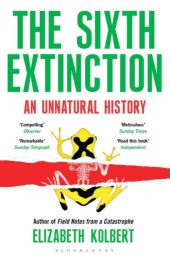 Neuerscheinungen 2015Stand: 2020-02-01 |
Schnellsuche
ISBN/Stichwort/Autor
|
Herderstraße 10
10625 Berlin
Tel.: 030 315 714 16
Fax 030 315 714 14
info@buchspektrum.de |

Elizabeth Kolbert
The Sixth Extinction
An Unnatural History. Winner of the Pulitzer Prize, General Nonfiction 2015
2015. 336 p. w. numerous fig. 20 cm
Verlag/Jahr: BLOOMSBURY TRADE 2015
ISBN: 1-408-85124-5 (1408851245)
Neue ISBN: 978-1-408-85124-1 (9781408851241)
Preis und Lieferzeit: Bitte klicken
Sie haben noch nie etwas vom Stummelfußfrosch gehört? Oder dem Sumatra-Nashorn? Gut möglich, dass Sie auch nie von ihnen hören werden, denn sie sind dabei auszusterben. Wir erleben derzeit das sechste sogenannte Massenaussterbeereignis: In einem relativ kurzen Zeitraum verschwinden ungewöhnlich viele Arten. Experten gehen davon aus, dass es das verheerendste sein wird, seit vor etwa 65 Millionen Jahren ein Asteroid auf der Erde einschlug, mit den bekannten Folgen für die Dinosaurier. Doch dieses Mal kommt die Bedrohung nicht aus dem All, sondern wir tragen die Verantwortung.
Wie keine andere Gattung zuvor haben wir Menschen das Leben auf der Erde verändert. In ihrem New York Times-Bestseller erklärt uns Elizabeth Kolbert, wie das geschehen konnte: Sie spricht mit Geologen, die verschwundene Ozeane erforschen, begleitet Botaniker, die der Waldgrenze in den Anden folgen, und begibt sich gemeinsam mit Tierschützern auf die Suche nach den letzten Exemplaren gefährdeter Arten. Sie zeigt, wie ernst die Lage ist, und macht uns zu unmittelbaren Zeugen der dramatischen Ereignisse auf unserem Planeten.
Over the last half a billion years, there have been five mass extinctions of life on earth. Scientists around the world are currently monitoring the sixth, predicted to be the most devastating extinction event since the asteroid impact that wiped out the dinosaurs. Elizabeth Kolbert draws on the work of researchers, geologists, botanists and marine biologists to tell the stories of a dozen species, including the Panamian golden frog and the Sumatran rhino, some already gone, others at the point of vanishing. The sixth extinction is likely to be mankinds most lasting legacy and compels us to rethink the fundamental question of what it means to be human.
Over the last half a billion years, there have been five mass extinctions of life on earth.
Scientists around the world are currently monitoring the sixth, predicted to be the most devastating extinction event since the asteroid impact that wiped out the dinosaurs.
Elizabeth Kolbert combines brilliant field reporting, the history of ideas and the work of geologists, botanists and marine biologists to tell the gripping stories of a dozen species - including the Panamanian golden frog and the Sumatran rhino - some already gone, others at the point of vanishing.
The sixth extinction is likely to be mankind´s most lasting legacy and Elizabeth Kolbert´s book urgently compels us to rethink the fundamental question of what it means to be human.
Elizabeth Kolbert war lange Journalistin für die New York Times und arbeitet heute als Reporterin für das Magazin The New Yorker, wo sie die Ressorts Politik und Ökologie betreut. Sie lebt in Williamstown, Massachusetts.


